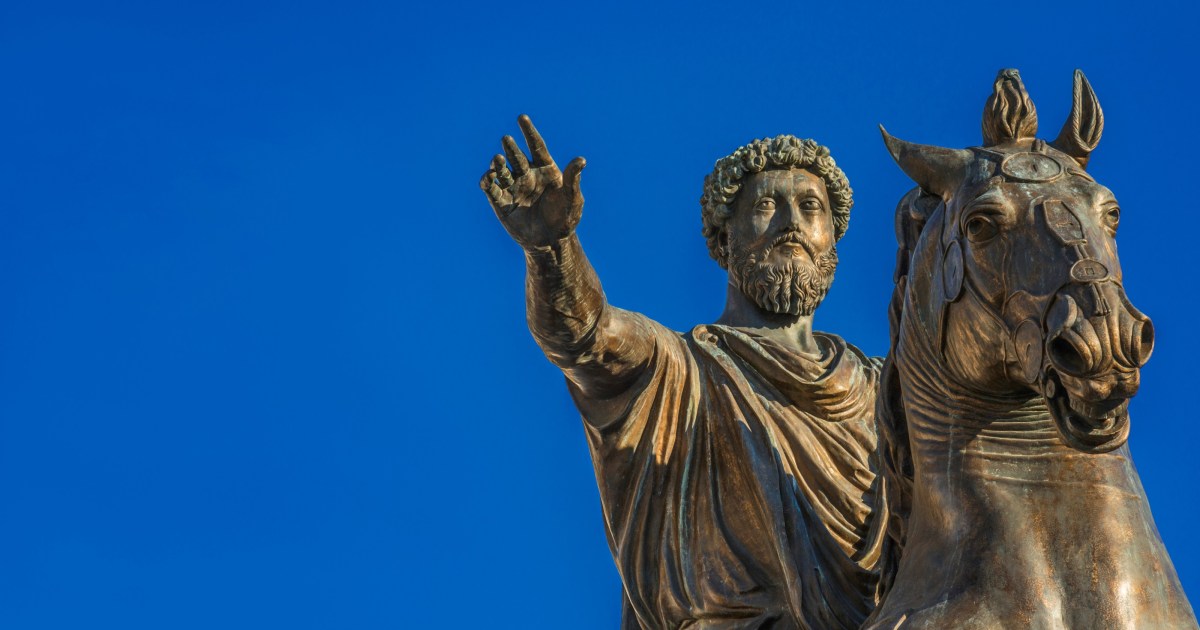Marcus Aurelius: The Legacy And The Misunderstood “Cuck” Label
Mar 22 2025
Marcus Aurelius, often regarded as one of history's greatest Stoic philosophers and Roman emperors, has recently become a subject of debate due to the modern label "cuck." This term, which originated in contemporary internet culture, has been retroactively applied to historical figures, including Marcus Aurelius. While this may seem absurd at first glance, exploring the context behind such labels sheds light on both the emperor's life and the evolution of language in the digital age.
Marcus Aurelius, a name synonymous with wisdom and leadership, ruled the Roman Empire from 161 to 180 AD. His contributions to philosophy, governance, and military strategy have left an indelible mark on history. However, the modern world's fascination with reinterpreting historical figures through contemporary lenses has led to the emergence of labels like "cuck," which raises questions about how we perceive historical figures today.
In this article, we will delve into the life of Marcus Aurelius, his philosophies, leadership qualities, and the controversies surrounding him. We will also explore the origin of the term "cuck" and its application to historical figures, examining whether this label holds any merit in the context of Marcus Aurelius's life. By the end, you will have a deeper understanding of both the man and the cultural phenomenon surrounding him.
Read also:Delicious Eggs Over Frankfurt The Ultimate Guide To Elevating Your Breakfast Game
Table of Contents
- Biography of Marcus Aurelius
- Early Life and Education
- The Philosophy of Stoicism
- Leadership and Governance
- Military Achievements
- Personal Life and Family
- The Origin of the Term "Cuck"
- Misapplication of the Term to Marcus Aurelius
- The Legacy of Marcus Aurelius
- Conclusion and Call to Action
Biography of Marcus Aurelius
Key Facts About Marcus Aurelius
Marcus Aurelius Antoninus Augustus was born on April 26, 121 AD, in Rome. He was the last of the Five Good Emperors and is often remembered as the philosopher-king. His reign was marked by a combination of philosophical introspection and practical leadership. Below is a summary of his key personal details:
| Full Name | Marcus Aurelius Antoninus Augustus |
|---|---|
| Birth Date | April 26, 121 AD |
| Death Date | March 17, 180 AD |
| Reign | 161–180 AD |
| Notable Works | Meditations |
Marcus Aurelius's life was a blend of philosophy, politics, and warfare. His reign was a testament to the Stoic principles he espoused, making him a unique figure in history.
Early Life and Education
Shaping the Mind of a Future Emperor
Marcus Aurelius's early life was heavily influenced by his mentors and the Stoic philosophy. He received an extensive education, studying under renowned philosophers such as Diognetus and Junius Rusticus. These formative years laid the foundation for his later works, particularly Meditations, which remains a cornerstone of Stoic thought.
His education was not limited to philosophy alone. Marcus was also trained in rhetoric, law, and military strategy, preparing him for the multifaceted role of an emperor. This holistic approach to learning contributed to his ability to balance philosophical introspection with practical governance.
The Philosophy of Stoicism
Understanding Marcus Aurelius's Stoic Principles
Stoicism, the philosophical framework that Marcus Aurelius embraced, emphasizes the importance of virtue, self-control, and rationality. In Meditations, Marcus wrote extensively about accepting the natural order of life and focusing on what is within one's control. His philosophy remains relevant today, offering guidance on how to navigate life's challenges with grace and resilience.
- Virtue: The pursuit of moral excellence.
- Self-Control: Mastery over one's emotions and desires.
- Rationality: The ability to think clearly and make sound decisions.
Leadership and Governance
A Philosopher-King's Approach to Ruling
As emperor, Marcus Aurelius applied Stoic principles to his governance. He prioritized justice, fairness, and the welfare of his subjects. His reign was marked by efforts to stabilize the empire during a period of external threats and internal challenges.
Read also:Peppers Boone A Comprehensive Guide To The Rising Star In The Entertainment Industry
Despite facing numerous wars and plagues, Marcus remained committed to his philosophical ideals. His leadership style was characterized by humility and a willingness to listen to advisors, qualities that set him apart from other rulers of his time.
Military Achievements
Defending the Roman Empire
Marcus Aurelius's military campaigns were a testament to his strategic acumen. He successfully defended the empire against invasions by Germanic tribes and the Parthians. These military achievements were not only a reflection of his leadership skills but also his ability to adapt to changing circumstances.
One of his most notable victories was the Marcomannic Wars, where he managed to secure the northern borders of the empire. This prolonged conflict tested his resilience and determination, qualities that resonated with his Stoic philosophy.
Personal Life and Family
Marriage and Children
Marcus Aurelius married Faustina the Younger, and together they had 13 children, though only five survived into adulthood. His personal life has often been scrutinized, particularly in the context of modern labels like "cuck." Critics argue that his focus on philosophy and governance may have led to neglect in his personal relationships.
However, historical records suggest that Marcus was deeply devoted to his family. His letters and writings reflect a man who valued his role as a husband and father, even amidst the demands of empire-building.
The Origin of the Term "Cuck"
From Historical Context to Modern Usage
The term "cuck" originated in internet culture and is derived from the word "cuckold," which historically referred to a husband whose wife has been unfaithful. In modern usage, the term has evolved to describe a man perceived as weak or emasculated, often in relation to his personal relationships.
This label has been retroactively applied to historical figures, including Marcus Aurelius, as a way to critique their perceived failures in the realm of masculinity. However, this application is often based on a misunderstanding of historical context and cultural norms.
Misapplication of the Term to Marcus Aurelius
Separating Fact from Fiction
The application of the "cuck" label to Marcus Aurelius is a prime example of how modern interpretations can distort historical reality. Critics argue that his philosophical focus and dedication to public service may have detracted from his personal life. However, this perspective fails to consider the complexities of his era and the demands of his position.
Marcus Aurelius's Stoic philosophy emphasized self-discipline and resilience, qualities that are inconsistent with the traits associated with the "cuck" label. His life and writings demonstrate a man who balanced personal and professional responsibilities with remarkable grace.
The Legacy of Marcus Aurelius
A Lasting Impact on Philosophy and Governance
Marcus Aurelius's legacy extends far beyond his reign as emperor. His contributions to Stoic philosophy and his example as a leader continue to inspire individuals and institutions worldwide. His ability to integrate philosophical principles into practical governance remains a model for effective leadership.
Despite the modern controversies surrounding his name, Marcus Aurelius's place in history is secure. His works, particularly Meditations, offer timeless wisdom that resonates with readers across generations.
Conclusion and Call to Action
In conclusion, Marcus Aurelius was a remarkable figure whose life and philosophy continue to influence the modern world. The misapplication of the "cuck" label to his name highlights the dangers of interpreting historical figures through contemporary lenses. By understanding the context of his life and achievements, we gain a deeper appreciation for his contributions to philosophy and governance.
We invite you to engage with this article by leaving your thoughts in the comments section. Share your perspective on Marcus Aurelius and the evolution of language in the digital age. Additionally, explore other articles on our site to deepen your understanding of history, philosophy, and leadership.


